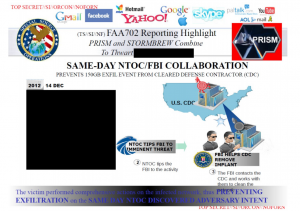James “Too Cute By Half” Clapper’s Denial
James Clapper made a somewhat unprecedented denial of Le Monde’s report (French, English) about the NSA’s dragnet, denying the eye-popping numbers on the volume of French spying (70.3 million in a month) we do.
October 22, 2013
Recent articles published in the French newspaper Le Monde contain inaccurate and misleading information regarding U.S. foreign intelligence activities. The allegation that the National Security Agency collected more than 70 million “recordings of French citizens’ telephone data” is false.
While we are not going to discuss the details of our activities, we have repeatedly made it clear that the United States gathers intelligence of the type gathered by all nations. The U.S. collects intelligence to protect the nation, its interests, and its allies from, among other things, threats such as terrorism and the proliferation of weapons of mass destruction.
The United States values our longstanding friendship and alliance with France and we will continue to cooperate on security and intelligence matters going forward.
Now, for what it’s worth, this seems the product of somewhat bad translation of the English for the Le Monde article, which started as this,
Parmi les milliers de documents soustraits à la NSA par son ex-employé figure un graphique qui décrit l’ampleur des surveillances téléphoniques réalisées en France. On constate que sur une période de trente jours, du 10 décembre 2012 au 8 janvier 2013, 70,3 millions d’enregistrements de données téléphoniques des Français ont été effectués par la NSA.
And then a worse translation back into English, which produced this,
Amongst the thousands of documents extracted from the NSA by its ex-employee there is a graph which describes the extent of telephone monitoring and tapping (DNR – Dial Number Recognition) carried out in France. It can be seen that over a period of thirty days – from 10 December 2012 to 8 January 2013, 70,3 million recordings of French citizens’ telephone data were made by the NSA.
I’m not going to explain this perfectly, but effectively it took a verbal that could mean the tape recording or the data notation of calls and turned it into a gerund that has the connotation in English of a discrete tape recording (note also the really cloddish use of the passive in a situation where you wouldn’t use it in English).
And from that, Clapper pounced on the “recordings” and presented them — in a quotation taken out of context — as discrete phone calls recorded individually. NSA’s not doing that, he says.
But we knew that. What they’re doing is intercepting call data in bulk and then sorting through what they want to keep.
It’s worth noting that the comment on the Boundless Informant screen Le Monde gets this from, however, refers to a more accurate calls “interceptées.” None of that excuses Le Monde’s presentation of it as such, particularly not its weak English translation which Clapper exploited (which isn’t, however, the actual language that has given François Hollande an opportunity to pretend to be shocked, and his English-only gotcha would be useful in refuting this for actual French readers). But that’s one source of the gotcha.
Now, as I said, this is relatively unprecedented. In the recent “interview” with Keith Alexander, NSA issued non-denial denials about info sharing with Israel. But there have been few very specific denials like this one.
And why would there be? Should we now assume all the other facts that have come out, anywhere in the world, are true? That Clapper has gone out of his way to do so, it seems, suggests the IC doesn’t dispute any other facts, which is almost certainly not the case, but nevertheless a fair assumption given their attention to this discrete point.
The one exception to this general rule, though, suggests why Clapper may have used this bad translation to claim gotcha! It just so happens to pertain to the WSJ story on upstream Internet collection, Read more →


